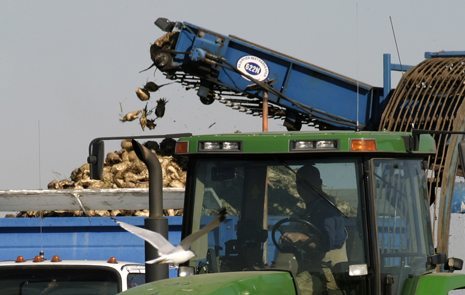Seeking diversity | Growers’ association spending money to identify new markets
Alberta sugar beet growers are exploring other uses for their crop besides sugar in all its forms.
The grower group has contracted North Vancouver based S2G BioChem to explore using sugar beets to produce bio-glycol, a derivative that can replace petrochemicals in the making of plastics, fibres, resins and biofuel.
A $600,000 contribution from the federal government, announced at the Alberta Sugar Beet Growers’ annual meeting Feb. 13 by Medicine Hat MP LaVar Payne, will take it further down the exploratory path.
Association president Rob Boras said another market for sugar beets would make the industry more viable in the future.
Read Also

Volatile temperatures expected for this winter
DTN is forecasting a lot of temperature variability in the Canadian Prairies this winter. Precipitation should be close to average.
As it stands, all sugar beet production is contracted to Lantic Sugar, which operates a plant in Taber, Alta. The number of contracted acres has been declining in recent years: from 36,000 several years ago to 30,000 last year and the next two years.
“We’ve been able to produce good quality crops. Sometimes that’s your downfall. If you create the volume and you’re serving a limited market, you do it with less acres,” Boras said.
“It’s not healthy for the overall industry. When we’re trying to attract new younger growers, at this level there’s no room for them to come in. What we’re looking at is an expansion of the sugar beet growing part of it.”
Sugar from the Alberta crop is processed and sold by Lantic, which supplies Western Canada’s needs with some left over for export. There doesn’t appear to be a growing demand for sugar.
“It’s virtually stagnant, the growth in that. The consumption is pretty well straight line,” said Boras.
“It’s pretty well capped at roughly 100,000 tons per year that we can fill, and from there, what do you do?”
Boras said beet production for sugar will continue even if diversification efforts come to fruition, but another production stream would complement the existing industry.
“It doesn’t hurt to have more than one processor in the business. As we can see in the potato business, with McCain’s and Lamb Weston, it is a very healthy industry because there are two players.”
A plant producing glycol and other products would also have the advantage of being “green” and renewable, while avoiding the food versus fuel debate. Boras foresees a plant that would have direct grower involvement as suppliers, investors and owners.
The initial stages of research look promising, he said, and are expected to be completed this fall, at which point decisions can be made about viability of a biochemical plant, capital investment and next steps.
Federal funds were channelled through the Canadian Agricultural Adaptation Program.
















